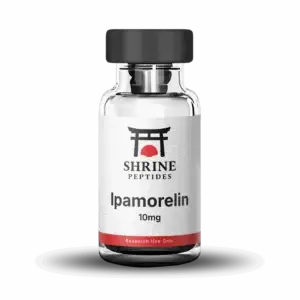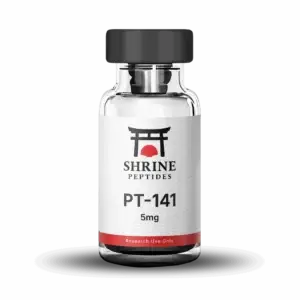MOTS-c (40mg)
$272.00
MOTS-c (40mg) – Research grade peptide for laboratory investigations and preclinical studies | Research Use Only – Not for Human Consumption
MOTS-c (40mg) Research Compound
Research Use Only – Not for Human or Animal Consumption
MOTS-c (40mg) is a synthetic research peptide that has been investigated in laboratory settings for its potential interactions with various biological pathways. This research compound has been studied in preclinical models to evaluate its pharmacological properties and potential mechanisms of action.1 Preliminary investigations have examined this peptide’s effects on cellular signaling pathways, receptor interactions, and physiological responses in controlled laboratory environments.
Research Overview
Laboratory studies have explored the potential biological activities of MOTS-c (40mg) through various experimental methodologies. Research has focused on characterizing the peptide’s structure-activity relationships, binding affinities to target receptors, and downstream signaling cascade activation.2 Preclinical investigations have utilized multiple research models to assess the compound’s pharmacokinetic properties, including absorption, distribution, metabolism, and elimination characteristics. These fundamental research efforts contribute to the broader understanding of peptide-based signaling mechanisms and their potential applications in biological research.
Preclinical Investigations
Research teams have conducted systematic investigations to evaluate MOTS-c (40mg)’s biological activities in controlled experimental settings. Studies have employed various in vitro and in vivo methodologies to assess the peptide’s effects on cellular processes, tissue function, and systemic responses in research models.3 Data from these investigations have contributed to understanding the peptide’s potential mechanisms of action, optimal dosing parameters for research applications, and potential interactions with biological systems.
Product Specifications
- Contents: MOTS-c (40mg)
- Form: Lyophilized powder
- Purity: >98% (verified by HPLC)
- Storage: Store at -20°C in a dry environment
- Reconstitution: Use bacteriostatic water for laboratory applications
- Stability: Stable when stored properly under recommended conditions
Quality Assurance and Documentation
- Third-party laboratory tested for purity and identity verification
- Certificate of Analysis (COA) available upon request for each batch
- HPLC chromatography results provided
- Mass spectrometry data available
- Manufactured under strict quality control protocols
- Batch-specific documentation and traceability
- Compliance with research-grade standards
Research Applications
- Peptide receptor interaction studies
- Cellular signaling pathway research
- Pharmacokinetic and pharmacodynamic investigations
- Structure-activity relationship studies
- Preclinical model research
- Biochemical pathway mapping
- Molecular mechanism elucidation
- In vitro biological activity screening
- Peptide stability and formulation research
- Comparative peptide pharmacology studies
Important Research Notice
FOR LABORATORY AND RESEARCH USE ONLY. This product is intended exclusively for scientific research, in vitro studies, and laboratory investigations. This compound is not intended for human or animal consumption, clinical applications, or any diagnostic or therapeutic uses.
Researchers should consult relevant scientific literature and follow appropriate safety protocols when handling this research compound. Proper laboratory equipment, personal protective equipment, and training are required for working with this material.
Regulatory Compliance Statement
This product is sold as a research chemical for laboratory use only. Shrine Peptides operates as a chemical supplier. Shrine Peptides is not a compounding pharmacy or chemical compounding facility as defined under 503A of the Federal Food, Drug, and Cosmetic Act. Shrine Peptides is not an outsourcing facility as defined under 503B of the Federal Food, Drug, and Cosmetic Act.
The statements made within this product description have not been evaluated by the US Food and Drug Administration. The products we offer are not intended to diagnose, treat, cure or prevent any disease. Human/Animal Consumption Prohibited. Laboratory/In-Vitro Experimental Use Only.
Please review and adhere to our Terms and Conditions before ordering.
References:
- Lee C, Kim KH, Cohen P. MOTS-c: A novel mitochondrial-derived peptide regulating muscle and fat metabolism. Free Radic Biol Med. 2016 Nov;100:182-187. doi: 10.1016/j.freeradbiomed.2016.05.015. Epub 2016 May 20. PMID: 27216708; PMCID: PMC5116416. https://www.ncbi.nlm.nih.gov/pmc/articles/PMC5116416/
- Mohtashami Z, Singh MK, Salimiaghdam N, Ozgul M, Kenney MC. Most Recent Mitochondrial Derived Peptide in Human Aging and Age-Related Diseases. Int J Mol Sci. 2022 Oct 9;23(19):11991. doi: 10.3390/ijms231911991. PMID: 36233287; PMCID: PMC9570330.
- Lee C, Zeng J, Drew BG, Sallam T, Martin-Montalvo A, Wan J, Kim SJ, Mehta H, Hevener AL, de Cabo R, Cohen P. The mitochondrial-derived peptide MOTS-c promotes metabolic homeostasis and reduces obesity and insulin resistance. Cell Metab. 2015 Mar 3;21(3):443-54. doi: 10.1016/j.cmet.2015.02.009. PMID: 25738459; PMCID: PMC4350682.
- Lu H, Wei M, Zhai Y, Li Q, Ye Z, Wang L, Luo W, Chen J, Lu Z. MOTS-c peptide regulates adipose homeostasis to prevent ovariectomy-induced metabolic dysfunction. J Mol Med (Berl). 2019 Apr;97(4):473-485. doi: 10.1007/s00109-018-01738-w. Epub 2019 Feb 6. PMID: 30725119. https://pubmed.ncbi.nlm.nih.gov/30725119/
- Reynolds JC, Lai RW, Woodhead JST, Joly JH, Mitchell CJ, Cameron-Smith D, Lu R, Cohen P, Graham NA, Benayoun BA, Merry TL, Lee C. MOTS-c is an exercise-induced mitochondrial-encoded regulator of age-dependent physical decline and muscle homeostasis. Nat Commun. 2021 Jan 20;12(1):470. https://pubmed.ncbi.nlm.nih.gov/33473109/
- Kim KH, Son JM, Benayoun BA, Lee C. The Mitochondrial-Encoded Peptide MOTS-c Translocates to the Nucleus to Regulate Nuclear Gene Expression in Response to Metabolic Stress. Cell Metab. 2018 Sep 4;28(3):516-524.e7. doi: 10.1016/j.cmet.2018.06.008. Epub 2018 Jul 5. PMID: 29983246; PMCID: PMC6185997. https://www.ncbi.nlm.nih.gov/pmc/articles/PMC6185997/
- Hu BT, Chen WZ. MOTS-c improves osteoporosis by promoting osteogenic differentiation of bone marrow mesenchymal stem cells via TGF-β/Smad pathway. Eur Rev Med Pharmacol Sci. 2018 Nov;22(21):7156-7163. doi: 10.26355/eurrev_201811_16247. PMID: 30468456. https://pubmed.ncbi.nlm.nih.gov/30468456/
- Qin Q, Delrio S, Wan J, Jay Widmer R, Cohen P, Lerman LO, Lerman A. Downregulation of circulating MOTS-c levels in patients with coronary endothelial dysfunction. Int J Cardiol. 2018 Mar 1;254:23-27. doi: 10.1016/j.ijcard.2017.12.001. Epub 2017 Dec 6. PMID: 29242099. https://pubmed.ncbi.nlm.nih.gov/29242099/
- Noriyuki Fuku el al., The mitochondrial-derived peptide: A player in exceptional longevity?, http://dx.doi.org/10.1111/acel.12389.








Reviews
There are no reviews yet.